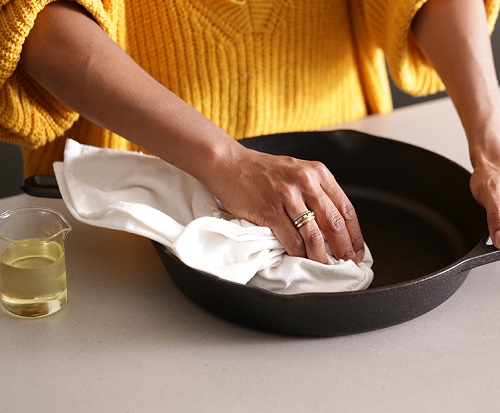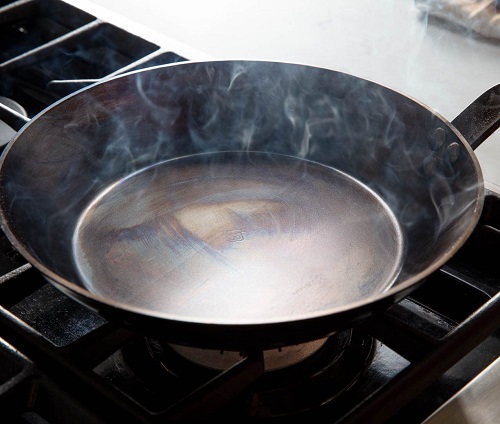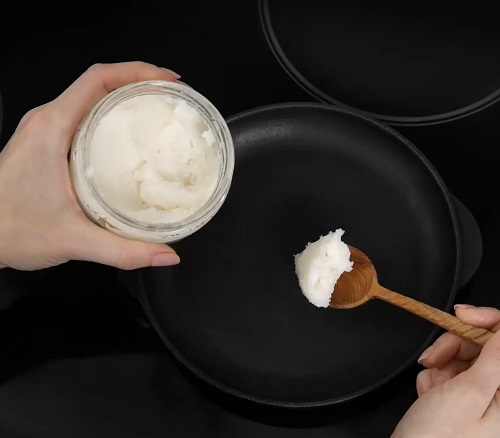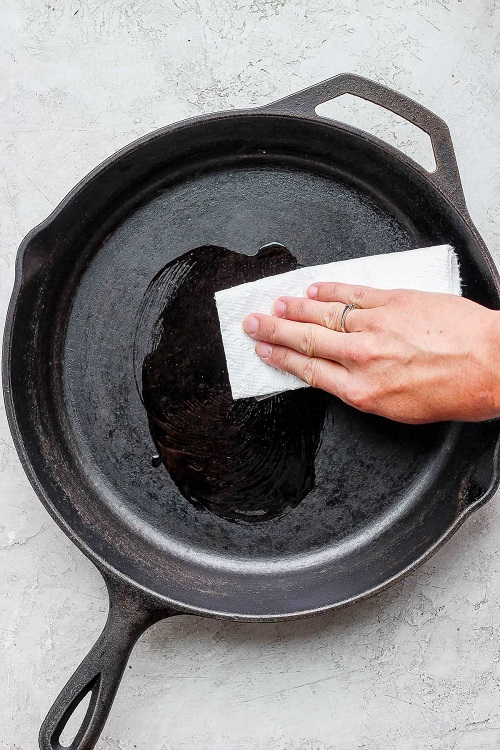Explore the benefits of Seasoning Cast Iron with Coconut Oil for a fine non-stick finish on your cookware!
Seasoning cast iron cookware is essential to enhance its durability and non-stick properties. This article will explore the benefits, application process, and potential considerations when Seasoning Cast Iron with Coconut Oil!
Select the Best Oil for Seasoning Cast Iron here
Why Season Cast Iron?
Cast iron cookware boasts a rich history, cherished for its unmatched heat retention and distribution capabilities. However, seasoning, often mistaken as a simple coating of oil, stands as a pivotal process. When heat meets oil on cast iron, a chemical reaction called polymerization occurs, forming a resilient layer on the pan’s surface.
This layer ensures durability, wards off sticking, and imparts a superior non-stick quality, enhancing your cooking professionally.
Learn about Seasoning Cast Iron with Olive Oil here
Can You Season Cast Iron with Coconut Oil?
Absolutely! In the realm of cast iron seasoning, coconut oil emerges as a star player, offering a range of benefits:
1. High Smoke Point
Virgin coconut oil boasts a high smoke point, typically above 350°F, depending on the refinement. This elevated smoke point makes it an excellent choice for seasoning cast iron cookware, as the oil can withstand the high temperatures required to polymerize and create a protective coating.
2. Exceptional Non-Stick Surface
Coconut oil excels in creating an impeccable non-stick surface on your cast iron cookware. In addition, it establishes a smooth and slick layer, preventing food from adhering and simplifying cleanup.
3. Prolonged Durability
Seasoning with coconut oil acts as a protective shield, guarding your cast iron from rust and corrosion. Additionally, this extended lifespan ensures your cherished cookware serves you for years to come.
4. Health-Conscious Cooking
Coconut oil, renowned for its healthful properties, brings a mindful approach to seasoning. Its medium-chain fatty acids and beneficial compounds make for a wholesome cooking medium.
5. Simplified Maintenance
Seasoning Cast Iron with Coconut Oil creates a smooth, non-stick surface, reducing food residues that stick to the pan. This inherent characteristic not only makes cooking more manageable but also simplifies cleaning.
The ease of maintenance ensures the cast iron’s longevity, with minimal upkeep required, making post-cooking cleanup quick and effortless.
6. Eco-Friendly and Natural
Utilizing Coconut oil for Seasoning Cast Iron is an environmentally conscious choice. Coconut oil is derived from the natural and renewable resource of coconut fruit, free from artificial additives or chemicals. Its use aligns with sustainable practices, promoting a green, eco-friendly alternative to synthetic non-stick agents.
7. Economical Choice
Coconut oil’s wide availability and affordability make it a cost-effective selection for seasoning. In addition, a small quantity goes a long way, ensuring efficient use.
Learn about Seasoning Cast Iron with Avocado Oil here
How to Season Cast Iron with Coconut Oil?
1. Preparation Phase
- Begin by meticulously cleaning the cast iron pan with hot water and a brush, ensuring all debris is removed.
- Thoroughly dry the pan to eliminate any moisture interfering with the seasoning process.
- Preheat your oven to 400°F in anticipation of the baking phase.
2. Coating with Coconut Oil
- Pour a small amount of coconut oil onto a cloth or paper towel.
- Gently rub the oil across the interior and exterior of the pan, assuring complete coverage.
3. Baking Phase
- Firstly, place the oiled cast iron pan upside down on the oven’s middle rack.
- Position aluminum foil or a baking sheet on the lower rack to catch any potential drips.
- Allow the pan to bake for approximately one hour, facilitating the polymerization of the oil into a durable, non-stick layer.
4. Cooling and Storage
- Turn off the oven and allow the pan to cool gradually inside.
- Once cooled, gently wipe off any excess oil that may have accumulated.
- Store your well-seasoned cast iron pan in a dry place until its next use.
Learn about Seasoning Cast Iron with Canola Oil here
Maintenance and Care
- 1. Select Ingredients Thoughtfully: Opt for ingredients that complement your seasoning efforts, avoiding acidic choices that could erode the protective layer.
- 2. Gentle Hand Washing: Preserve the seasoning by hand washing your skillet with mild soap, avoiding the dishwasher.
- 3. Regular Re-Seasoning: Re-season your cast iron skillet as needed, especially if you notice diminishing luster or food sticking.
Key Takeaways
Using Coconut Oil to Season Cast Iron cookware makes cooking easier and more enjoyable. It creates a non-stick surface that can make every meal better. With coconut oil, your cast iron pan becomes a helpful tool in your kitchen, making cooking simpler and cleaning up easier. It’s a great way to take care of your pan and enjoy your home cooking.
FAQs
1. Is Coconut Oil a Good Choice for Seasoning Cast Iron?
Absolutely! Coconut oil is an excellent choice for seasoning cast iron. It creates a non-stick surface and offers other benefits like prolonged durability, health-conscious cooking, and versatility in high-heat methods.
2. Can I Use Regular Cooking Coconut Oil for Seasoning?
Yes, you can use regular cooking coconut oil for seasoning cast iron. Look for unrefined or virgin coconut oil, which retains more natural compounds contributing to the seasoning process.
3. How Often Should I Re-season My Cast Iron with Coconut Oil?
The frequency of re-seasoning depends on factors like usage and cleaning methods. As a general guideline, if you notice diminished non-stick properties or your food starts sticking, it’s a good time to re-season your cast iron with coconut oil.
4. Can I Season Cast Iron with Coconut Oil on an Outdoor Grill?
You can season cast iron with coconut oil on an outdoor grill. Follow the same steps of coating the pan with coconut oil and baking it at the recommended temperature on your grill. Just ensure you have a consistent and controlled heat source for proper polymerization.





